|
Report from
Europe
Rebound in UK imports continued in September but
prospects less certain
UK imports of tropical wood and wood furniture products
continued to rebound in September, with total value rising
to USD97.6 million, 30% more than the previous month
and the same level as in September 2019 (Chart 1).
UK imports strengthened significantly in the third quarter,
in line with the recovery in the broader economy and in
construction activity and the housing market as lockdown
measures eased during the period.
Prospects for the final quarter of the year are less certain,
with signs that the economic recovery is losing momentum
and the reintroduction of lockdown measures nationwide
in England from 5 November, due to last for at least four
weeks, in response to a sharp rise in COVID-19 cases.
Meanwhile, the Brexit transitional period comes to an end
on 31 December and according to the Economist,
reporting on 12th November, there is ¡°no trade deal in
sight¡±.
The Economists observes that ¡°talks are continuing, but
agreement is elusive on the most contentious issues: a
level playing-field for competition (including limits to
state aids), fisheries, and dispute resolution. Michel
Barnier, the EU negotiator, says the talks are not currently
on a path to a deal¡±.
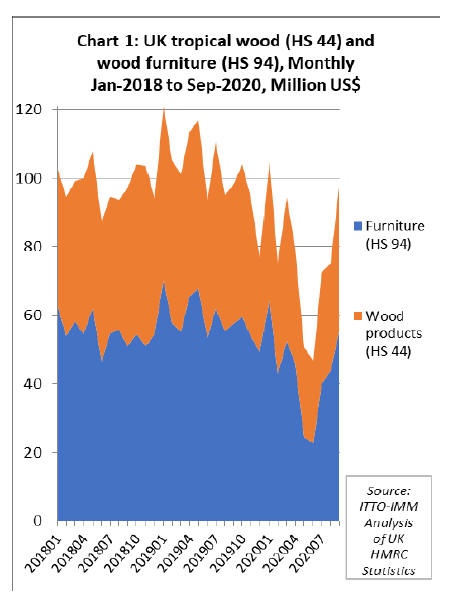
The total value of UK imports of tropical wood and wood
furniture into the UK in the third quarter of 2020 was
USD245 million, 39% more than the second quarter of the
year.
However, import value in the third quarter of this year was
19% below the same period of 2019. Import value in the
January to September period this year was USD697
million, 27% less than the same period in 2019.
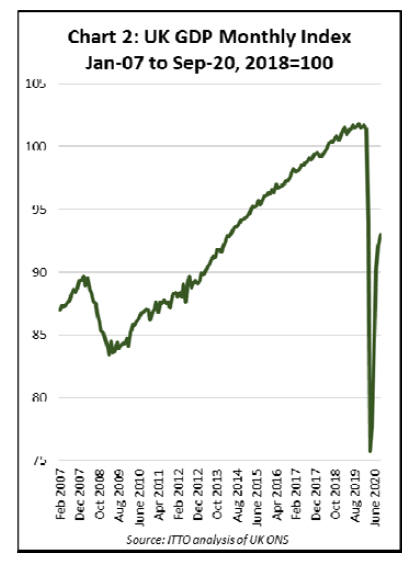
According to official UK statistics, GDP grew by 15.5% in
the third quarter as restrictions on movement eased across
June, July, August and September. Monthly GDP grew by
1.1% in September 2020, the fifth consecutive monthly
increase following a record fall of 19.5% in April 2020.
September 2020 GDP was 22.9% higher than its April
2020 low. However, it remains 8.2% below the levels seen
in February 2020, before the full impact of the COVID-19
pandemic. There was also a loss in momentum through the
third quarter of 2020 (Chart 2 above).
UK construction output volume rebounded strongly
between May and August this year following a record fall
of 41.2% in April. However the pace of recovery in the
sector slowed in September with growth of only 2.9%
during the month. The latest increase is being driven
primarily by new housing (Chart 3).
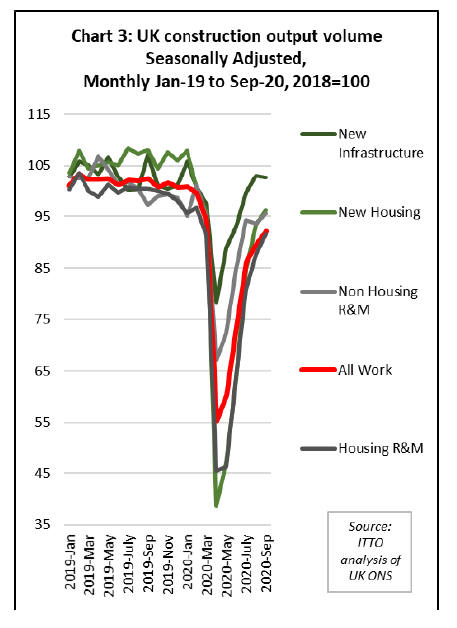
Despite recent recovery in the UK construction sector,
output in September was still 7.3% lower than the level in
February 2020 before the full impact of the coronavirus.
The infrastructure and private new housing sub-sectors are
the only components of construction to return to their peak
since February 2020.
On a quarterly basis, the UK construction sector grew by
41.7% in the third quarter this year following a record fall
of 35.7% in the second quarter.
UK tropical wood furniture imports gain momentum in
September
Overall UK imports of tropical wood furniture products in
the nine months to end September this year were USD392
million, 28% less than the same period in 2019. However,
imports gained momentum during September, rising to
USD55.3 million compared to USD43.9 million in August
and a low of only USD24.5 million in May during the first
lockdown period.
However, comparing the first nine months of 2020 with
the same period last year, UK imports of wood furniture
declined sharply from all the leading tropical supply
countries (Chart 4).
Imports from Vietnam were down 33% to USD191
million, imports from Malaysia fell 28% to USD84
million, imports from Indonesia declined 29% to USD36
million, imports from India fell 30% to USD28 million
and imports from Thailand were down 25% to USD12
million. In contrast, there was a 25% rise in imports from
Singapore, to USD31 million.
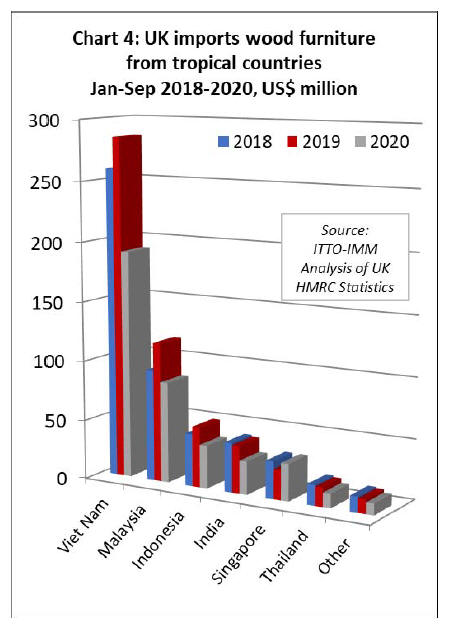
Recovery in value of tropical wood products
UK imports of all tropical wood products in Chapter 44 of
the Harmonised System (HS) of product codes in the
month of September were USD42 million, a significant
recovery from only USD31 million in the previous month
and well up on the historic low of only USD24 million in
June. Imports in September this year were 5% more than
in the same month of 2019.
However, comparing the first nine months of 2020 with
the same period in 2019, total UK import value of tropical
wood products was, at USD305 million, 26% less than the
same period in 2019.
Import value of joinery products was down 14% at
USD110 million, tropical plywood was down 36% at
USD95.7 million, tropical sawnwood fell 26% to
USD54.7 million, and mouldings/decking declined 38% to
USD13.1 million (Chart 5).
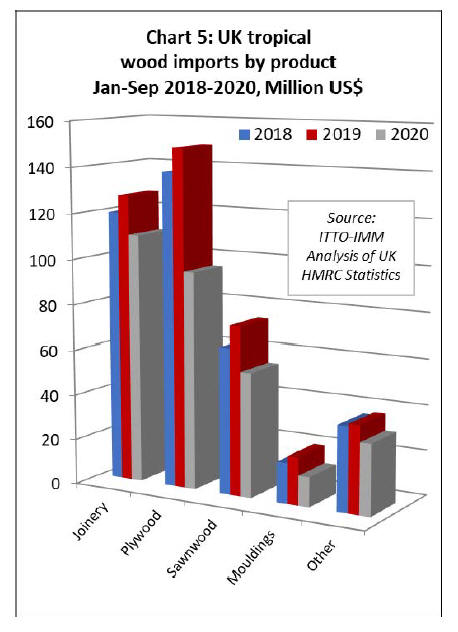
Signs of recovery in UK imports of wooden doors from
Indonesia
After making gains in 2019, UK imports of tropical
joinery products from Indonesia, mainly consisting of
doors, fell 19% to USD62 million in the first nine months
of this year (Chart 6). UK imports of wooden doors from
Indonesia made up ground in September after very low
imports in June, July and August.
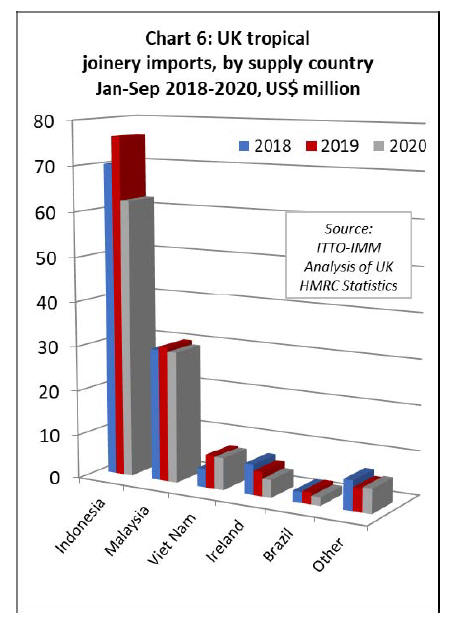
After a strong start to the year, UK imports of
joinery
products from Malaysia and Vietnam (mainly laminated
products for kitchen and window applications) stalled
almost completely in May before recovering slowly in the
summer months and gaining momentum in September.
Total joinery imports in the first nine months were down
3% from both Malaysia and Vietnam, to USD29.4 million
and USD7.5 million respectively.
UK trade in joinery products manufactured from tropical
hardwoods in neighbouring Ireland have also fallen
dramatically this year, down 27% to USD3.9 million in the
first nine months.
UK imports of tropical hardwood plywood from China
rising
The UK imported 83,500 cu.m of tropical hardwood faced
plywood from China in the first nine months of this year,
47% less than the same period last year (Chart 7). UK
imports of plywood from China ground to halt earlier this
year when China went into lockdown.
There were hardly any deliveries from February through to
early April and UK importers were forced to live off
inventories. However imports picked up during the
summer months, rising into September with the arrival of
significant volumes under delayed contracts.
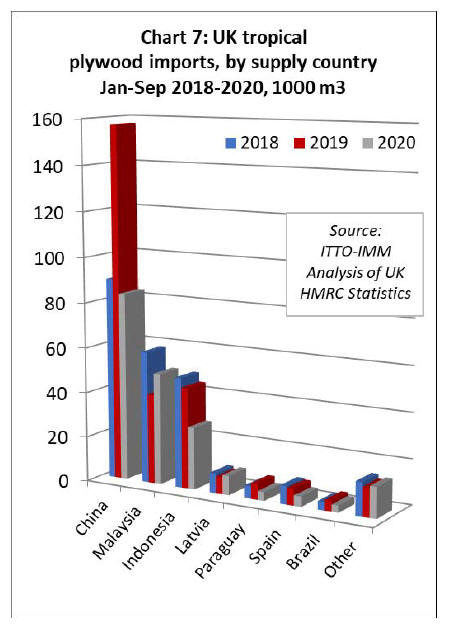
Likely due to supply problems in China, UK imports
of
plywood from Malaysia, which were in long term decline
before this year, have recovered some ground during the
pandemic period. Despite significant slowing in May,
imports from Malaysia were still up 24% at 49,500 cu.m
for the first nine months of the year.
In contrast to Malaysian plywood, UK imports of
Indonesian plywood fell 39% to 27,500 cu.m in the first
nine months of the year. In addition to supply problems
during the pandemic, Indonesian plywood has come under
very intense competitive pressure from Russian birch
plywood this year.
UK imports of tropical hardwood plywood from South
America declined in the first nine months of this year,
down 44% from Paraguay to 3,900 cu.m and down 44%
from Brazil to 3,100 cu.m.
In recent years, the UK has been importing small volumes
of tropical hardwood plywood from Latvia and Spain. In
the first nine months of 2020, imports increased 13% to
8,500 cu.m from Latvia but fell 38% to 4,600 cu.m from
Spain.
UK tropical sawn hardwood imports recover ground in
the third quarter
The UK is now a relatively minor market for tropical sawn
hardwood, importing less than 100,000 cu.m in each of the
last two years, making it only the fifth largest European
importer for this commodity (after Belgium, Netherlands,
France and Italy).
While the UK trade in sawn tropical hardwood fell sharply
in May and June this year, there was some recovery in the
third quarter, particularly from Cameroon and Latin
America. However imports were still down from most
major supply countries by the end of September (Chart 8).
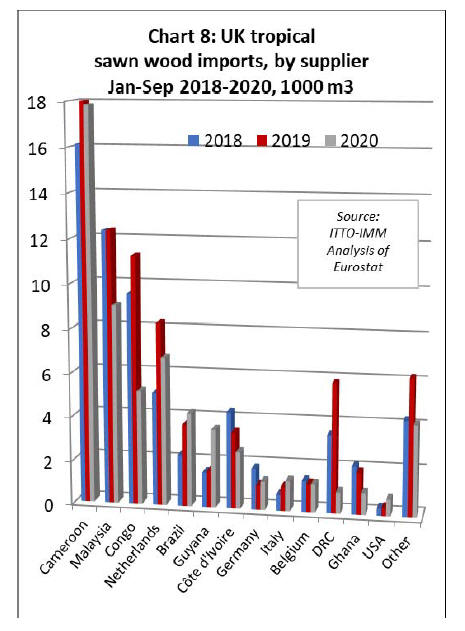
UK imports from Cameroon, the leading supplier, declined
sharply in June this year to just below 1000 cu.m for the
month, but rebounded strongly to an average of 2600 cu.m
per month in July, August and September.
Total UK imports from Cameroon in the first nine months
of the year were down only 4% compared to the same
period in 2019.
In contrast to Cameroon, UK imports from other African
supply countries have been extremely slow this year,
declining sharply during the first lockdown and yet to
show any signs of recovery.
In total in the first nine months of the year, imports from
the Republic of Congo declined 54% to 5,200 cu.m,
imports were down 25% to 2,600 cu.m from Côte d'Ivoire,
down 84% to only 976 cu.m from DRC and down 48% to
985 cu.m from Ghana.
UK imports from Malaysia were 9,000 cu.m in the first
nine months of 2020, 27% less than the same period in
2019. However imports from Malaysia, having fallen to
just 315 cu.m in June (which surely must be an all-time
monthly low for this trade), had recovered to 1356 cu.m
for the month of September.
The UK imported 6,750 cu.m of tropical sawnwood
indirectly via the Netherlands in the first nine months of
2020, 19% less than during the same period last year.
However, there was significant growth in this indirect
trade in 2019 and imports so far this year are higher than
in the same period in 2018.
UK imports of sawn tropical hardwood from South
America, although still limited, have been more buoyant
this year than in 2019 despite the pandemic. Imports from
Brazil increased 14% to 4,200 cu.m in the first nine
months of 2020, with particularly good volumes arriving
in July before falling away in August and September.
UK imports from Guyana increased 113% to 3,550 cu.m
in the first nine months of the year with reasonably
consistent volume averaging around 600 cu.m arriving
each month since April. The UK is currently the only
European country importing commercial volumes of wood
from Guyana on a regular basis.
STTC Conference - tropical wood contribution to green
recovery in Europe
The core theme of the online 2020 Sustainable Tropical
Timber Coalition (STTC) Conference, due to be held
online on 19 November, will be how the sustainable
tropical timber sector can take the opportunity of and
contribute to a post-pandemic reboot of the global
economy on cleaner, greener lines.
In introducing the Conference, STTC - an alliance of
industry, business, government and NGOs dedicated to
increasing European demand for verified sustainable
tropical timber - notes that:
¡°the priorities of businesses worldwide are shifting due to
the economic uncertainties caused by the Covid-19
pandemic. Many are in survival mode. At the same time,
there is growing appreciation across industry, amongst
politicians and societies more broadly that we should not
aim simply to go back to business as usual. In line with
such strategies as the EU Green Deal and as stated among
others by the new European Green Recovery Alliance of
NGOs, businesses and politicians, the goal should be a
lower environmental impact new normal. The focus is
increasingly on establishing a sustainable circular
bioeconomy¡±.
The circular bioeconomic model will be a central STTC
Conference topic; how it operates, its benefits and how the
timber sector and the tropical timber sector in particular
can form a key component of a bioeconomic future.
Perspectives will come from circular economy specialists,
producer countries, urban authorities and bioeconomic
business innovators.
STTC Conference speakers will examine the wider effects
of the pandemic, notably, by underlining our
interdependence and vulnerability, the renewed focus it
has put on that other global crisis facing us ¨C the climate
emergency. The EU Green Deal will also be discussed,
with its pledges to support deforestation-free value chains,
restore biodiversity, eliminate net EU greenhouse gas
emissions by 2050 and boost efficient use of resources by
moving to a clean, circular economy.
The event will include presentations, panel discussions,
question and answer sessions and delegate thematic
sessions. One of the keynotes will be delivered by Lee
White, Minister of Water and Forestry in Gabon,
responsible for the implementation of the announcement
by President Ali Bongo in 2017 that all Gabonese forests
have to be certified for sustainable forest management by
2022.
Another keynote will be delivered by Hugo Schally, Head
of Sustainable production, products and consumption, DG
Environment, who is coordinating and developing the
European Commission¡¯s work on the links between trade
and environment as well as on deforestation and forest
degradation.
The STTC Conference is free of charge and takes place
online on Zoom from 09.00am to 13.00pm CET on
Thursday November 19. For registration:
See:
http://www.europeansttc.com/19-november-2020-onlineconference-holding-the-line/#tab-id-1
| 
